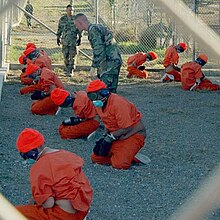Sensory deprivation
Sensory deprivation is the withdrawal ( deprivation ) of sensory stimuli ( i.e. sensory impressions , see also perception ). The terms stimulus withdrawal and stimulus deprivation are used as synonyms for sensory deprivation , but much less often.
If the person is completely shielded from external stimuli, hallucinations and a changed consciousness soon set in . Stimulus deprivation can be used for neurological and psychological experiments or to expand consciousness , for example by means of an isolation tank .
torture

Sensory deprivation is, among other things, a subtle but very effective torture method and can be used for brainwashing . This method is used e.g. B. used in the form of solitary confinement or by using a so-called camera silens . The method of isolation is perfected in part by shielding the senses as much as possible ( eyes , ears , mouth , nose , hands , feet , skin ). In this way, the time until the desired effect occurs can be reduced and this extremely increased.
In photos of the US prison camp in Guantánamo Bay that were widely used in the media, for example, one sees the prisoners kneeling in orange clothes, breathing masks , blindfolds , hearing protection , gloves and handcuffed hands and feet. This is officially done for their protection, but there is a suspicion that this treatment is part of an interrogation designed to break any psychological normality through sensory deprivation.
Prolonged sensory deprivation can lead to personality changes, psychological damage, disorders of the feeling of hunger and satiety, increased suggestibility , sleep disorders and difficulties in contact with other people. There can even be changes in metabolism.
Sensory deprivation is one of the torture methods that leave no obvious traces on the victims ( white torture ). This form of torture also contradicts human rights according to the human rights declaration of the United Nations and the European Convention on Human Rights : "Nobody may be subjected to torture or cruel, inhuman or degrading treatment or punishment."
Demarcation
The term sensory deprivation is also used in other areas, for example in meditation , esotericism (see psychonautics , John C. Lilly ), in the wellness area (see floating ) or in the context of erotic deprivation of the senses in the BDSM or fetish area. The use of the techniques is differentiated by the voluntary nature of the deprivation of the person concerned.
literature
- A. Engels: Sensory deprivation - isolation equals torture or isolation equals therapy? In: Group Dynamics - Research and Practice. Issue 3, June 1977, pages 163-170.
Web links
- Isolated - The Solitude Experiment (OT: Total Isolation ), BBC broadcast , 2008
- Psychological phenomenon: When the brain goes on a trip , article by Erich Kasten in Spiegel Online , November 6, 2011 (originally published in Brain & Spirit )
Individual evidence
- ↑ Naomi Klein: Solitary confinement in the network of justice. (Translation from: The US psychological torture system is finally on trial. , The Guardian , February 23, 2007)